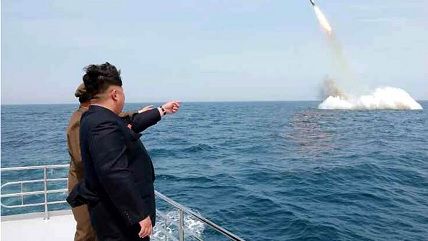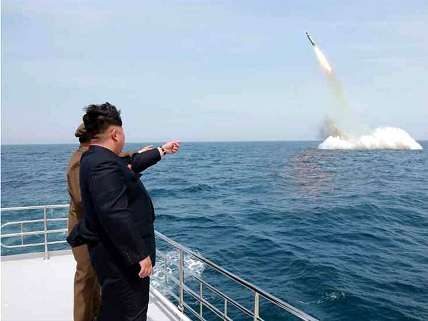Russian, Chinese Foreign Ministers Complain About North Korea Missile Tests, U.S. Korean Missile Defense System
Dealing with the consequences of China's interventionist foreign policy.


Russian Foreign Minister Sergei Lavrov and Chinese Foreign Minister Wang Yi met a day after North Korea test-fired two short-range ballistic missiles into the sea as part of the hermetic Communist dictatorship's latest round of nuclear sabre-rattling.
"We do not recognize the nuclear status of the DPRK," Wang said at a press briefing, via translator, as reported by Reuters. "We should block further development of nuclear weapons in the DPRK," he said later. The two urged North Korea to return to six party talks—involving the U.S., China, Rusia, Germany, France, and the U.K, and called the missile test "irresponsible."
The two also criticized U.S. maneuvers on the Korean peninsula. "The deployment of this U.S. missile system far exceeds the actual defense needs of the (Korean) peninsula," said Wang, and "will harm the strategic balance of power in the region, possibly leading to a new arms race."
China's meddling foreign policy has placed it in the position of having a client state next door that behaves in a way that invites military buildups in the region. While Wang expressed concern about a renewed arms race, he acknowledged last month that the decision on the missile system ultimately fell on South Korea, where it was being deployed and that China understood South Korea and the U.S.'s desire to ensure their defenses. China appears to have imposed a new round of sanctions on North Korea unilaterally earlier this week.
China says it's concerned the missile system, reportedly consisting of Terminal High Altitude Area Defense batteries, reaches deep into its interior. President Obama called on an "Asia pivot" back in 2011, looking to challenge China in the Pacific theater. Since then, China's foreign policy in the region has only become more aggressive.
At last night's Republican debate, John Kasich suggested the U.S. should put "heat" on China to "work in North Korea" to get rid of the country's dictator. China's Korea policy did a good job on its own of doing that. Donald Trump, the Republican frontrunner, bemoaned that the U.S. was protecting South Korea without getting paid for it.
"Every time this maniac from North Korea does anything, we immediately send our ships," Trump said. "We get virtually nothing."
Not quite. While the U.S.'s military defense commitments around the world have long outlived any geopolitical or diplomatic usefulness they may have had, they continue to fuel a domestic military industry that supports millions of jobs, an underlying, if often unspoken, reason for bipartisan support for increased "defense" spending and military intervention irrespective of the particular sectarian rhetoric.


Show Comments (111)